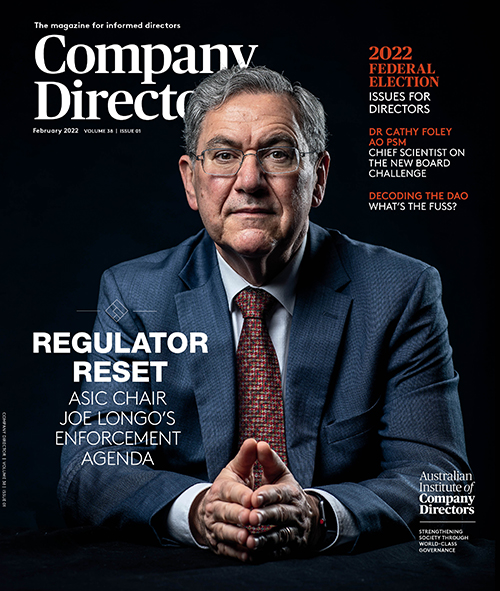ESG reporting, gender diversity on boards and modern slavery are primary focal points for the AICD in 2022, writes Louise Petschler GAICD.
ESG reporting
All directors will be across the increasing focus on environmental, social and governance (ESG) issues and the growing ESG concerns of stakeholders and shareholders. What was once seen as a specialised area is very much mainstream governance — and a major challenge for boards navigating stakeholder and community expectations on transparency.
With growing demand for quality reporting on ESG topics, the lack of consistent global and domestic standards and frameworks to support consistent assurance in reporting is a real challenge. Companies face hurdles in providing ESG reporting, with different frameworks favoured by jurisdiction, stakeholder group or research firm. Assurance and comparability is challenging and remains relatively immature.
And while climate and environmental impacts are front of mind, reporting demands are increasing across a range of ESG areas. In Australia, biodiversity, engagement with First Nations peoples, modern slavery and workplace sexual harassment are growing areas of focus.
The regulatory landscape for ESG and sustainability disclosures will be a big focus for global regulation this year. At the global level, the AICD has welcomed the announcement (at COP26 in November 2021) of the formation of the new International Sustainability Standards Board (ISSB). Established under the umbrella of the International Financial Reporting Standards Foundation (IFRS), this new group has a mandate to develop and promote globally consistent ESG reporting standards. Climate reporting will be the first area of focus and the ISSB has issued a draft prototype climate standard.
Greater consistency and harmonisation of ESG reporting frameworks is critically important. There is much more work to be done across existing frameworks at the global level. We anticipate this will be a major agenda for global and domestic standard setters through 2022.
Other jurisdictions are also moving more aggressively on mandating climate disclosure, with the European Union, the UK and New Zealand all taking steps, and the US Securities and Exchange Commission expected to release proposals early this year.
The Australian Accounting Standards Board has released a consultation on a voluntary climate standard and a focus on “extended corporate reporting” — to which the AICD will contribute.
These developments, combined with continued investor and stakeholder expectations, mean non- financial reporting will remain a high priority for Australian boards. Directors are encouraged to stay up to date on evolving standards and investor expectations on ESG reporting.
Modern slavery
One important area of ESG focus is modern slavery prevention. In Australia, we are through the second year of modern slavery reports under the mandatory scheme for companies with over $100m turnover. In a recent consultation, the government advised the AICD that while quality overall is improving, boards need to increase their focus on:
- Appropriate sign-off endorsed by the board
- Greater detail on engagement with subsidiaries in modern slavery statements
- Increased reporting on the effectiveness (if any) of actions taken by companies
- Detail on overseas supply chain risks, not just operations.
A statutory review of the modern slavery legislation is expected to begin early this year. It will consider the impact of the reporting laws as well as issues such as lowering reporting thresholds and introducing civil penalties for companies breaching their obligation. AICD will provide more detail and seek director views when the review opens.
Legislative agenda
The AICD will be engaging with a range of legislative and regulatory issues in 2022. Some early starters on the legislative front are:
- Modernisation of the Corporations Act 2001 — electronic communication and virtual AGMs
- Financial Accountability Regime — expanding accountability measures in financial services
- Proxy advice regulation — with new regulations made in late 2021 to introduce licensing of proxy advice firms and additional transparency and independence
- Charity governance — the Senate late last year disallowed changes to Australian Charities and Not-for-profits Commission Governance Standard 3, which targeted promotion of unlawful activity. The AICD has raised concerns about the broad discretion to deregister charities proposed by government.
The new Financial Regulator Assessment Authority is also conducting its first targeted assessment of ASIC’s strategic prioritisation, planning and decision-making, with a report due by the end of July. The independent review of the insolvency safe harbour is also expected to be released shortly.
Latest news
Already a member?
Login to view this content



